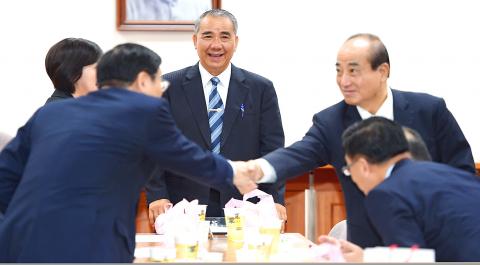The Chinese Nationalist Party (KMT) caucus yesterday voiced concerns over KMT Chairwoman Hung Hsiu-chu’s (洪秀柱) announcement of a possible meeting with Chinese President Xi Jinping (習近平), urging Hung to insist on the “one China, different interpretations” principle during the meeting.
KMT caucus convener Sufin Siluko (廖國棟) said it would be good if Hung could make breakthroughs when cross-strait relations have come to a halt, but the caucus had not been informed about the proposed meeting until it was revealed by the media.
“We lawmakers as the firstline of the party believe that it is necessary to have more communication with the chairwoman” before her China trip, Sufin said.

Photo: Liu Hsin-de, Taipei Times
He said he shares some of the KMT Central Standing Committee members’ concerns about Hung’s “one China, same interpretation” position, which has not been clarified, and that if it is brought up in China it could provide fodder for the party’s opponents to “vilify the KMT.”
“Many [KMT] lawmakers have expressed similar concerns,” he added. “That is why we need to arrange a meeting with Hung as soon as possible, for clarification and to make sure that we have a common goal.”
The convener said Hung’s office had arranged a meeting with lawmakers to be held on Nov. 12, but he talked to KMT Secretary-General Mo Tien-hu (莫天虎) on Thursday and demanded a meeting before Hung’s trip to China on Oct. 30. Hung has agreed to the change, Mo said.
Sufin said the caucus believes that Hung, during her meeting with Xi, should “loudly emphasize ‘one China, different interpretations.’”
Underlining that the lawmakers represent millions of people, the convener told reporters on Thursday that KMT lawmakers fear that Hung might “deviate from public opinion.”
KMT Legislator Wang Jin-pyng (王金平) yesterday said that it is not surprising that a meeting between Hung and Xi would be arranged when a KMT-Chinese Communist Party forum is to be held.
“What is to be talked about [during that meeting] needs further discussion” within the party, Wang said. “‘One China, same interpretation’ has not obtained a consensus within the party; a consensus is also needed in Taiwan as a whole.”
The former legislative speaker said Hung would also need China to concur for a consensus to be reached, adding that “there is still a long way to go.”
KMT Policy Committee executive director Alex Tsai (蔡正元) said the original plan was that Hung would explain to the caucus what her discussion with Xi had achieved after the meeting, as there is no convention within the KMT that the chairperson reports to lawmakers.
However, Hung would meet with KMT lawmakers in two groups to exchange views, Tsai said.
KMT Vice Chairman Hau Lung-bin (郝龍斌) said the meeting should focus on economic and trade-related issues and as long as the KMT stands firm on safeguarding Taiwan’s interests and stance, there is no need to be afraid of being “vilified.”
Hau is not planning to attend the forum and believes that, since it is the first forum since the KMT became the opposition, communication with the caucus is necessary before Hung’s trip.
Additional Reporting by CNA

PREPAREDNESS: Given the difficulty of importing ammunition during wartime, the Ministry of National Defense said it would prioritize ‘coproduction’ partnerships A newly formed unit of the Marine Corps tasked with land-based security operations has recently replaced its aging, domestically produced rifles with more advanced, US-made M4A1 rifles, a source said yesterday. The unnamed source familiar with the matter said the First Security Battalion of the Marine Corps’ Air Defense and Base Guard Group has replaced its older T65K2 rifles, which have been in service since the late 1980s, with the newly received M4A1s. The source did not say exactly when the upgrade took place or how many M4A1s were issued to the battalion. The confirmation came after Chinese-language media reported

The Taiwanese passport ranked 33rd in a global listing of passports by convenience this month, rising three places from last month’s ranking, but matching its position in January last year. The Henley Passport Index, an international ranking of passports by the number of designations its holder can travel to without a visa, showed that the Taiwan passport enables holders to travel to 139 countries and territories without a visa. Singapore’s passport was ranked the most powerful with visa-free access to 192 destinations out of 227, according to the index published on Tuesday by UK-based migration investment consultancy firm Henley and Partners. Japan’s and

A Ministry of Foreign Affairs official yesterday said that a delegation that visited China for an APEC meeting did not receive any kind of treatment that downgraded Taiwan’s sovereignty. Department of International Organizations Director-General Jonathan Sun (孫儉元) said that he and a group of ministry officials visited Shenzhen, China, to attend the APEC Informal Senior Officials’ Meeting last month. The trip went “smoothly and safely” for all Taiwanese delegates, as the Chinese side arranged the trip in accordance with long-standing practices, Sun said at the ministry’s weekly briefing. The Taiwanese group did not encounter any political suppression, he said. Sun made the remarks when

BROAD AGREEMENT: The two are nearing a trade deal to reduce Taiwan’s tariff to 15% and a commitment for TSMC to build five more fabs, a ‘New York Times’ report said Taiwan and the US have reached a broad consensus on a trade deal, the Executive Yuan’s Office of Trade Negotiations said yesterday, after a report said that Washington is set to reduce Taiwan’s tariff rate to 15 percent. The New York Times on Monday reported that the two nations are nearing a trade deal to reduce Taiwan’s tariff rate to 15 percent and commit Taiwan Semiconductor Manufacturing Co (TSMC, 台積電) to building at least five more facilities in the US. “The agreement, which has been under negotiation for months, is being legally scrubbed and could be announced this month,” the paper said,